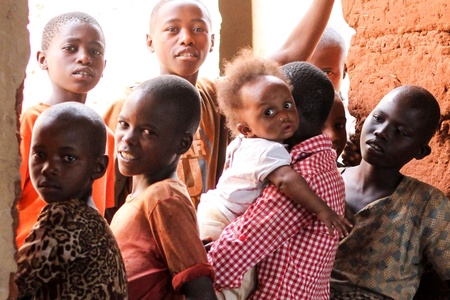The urgent need to improve children and adolescents' wellbeing in sub-Saharan Africa took a significant step forward on 3 October when work on a £2.9million international research project, funded by the National Institute for Health Research (NIHR), got underway in earnest.
Mental health issues are the leading cause of illness among young people aged 7-19 years, with about one in seven experiencing mental health problems.
The World Health Organisation states that by 2030 mental health issues will form the biggest burden on health care resources and recommends preventative interventions in schools. However, it remains an under-researched issue in many of the least developed countries in the world.
Today research partners and stakeholders in Scotland, Rwanda and Ethiopia came together virtually for the first time to officially launch the four-year trans-disciplinary project that will design and test a mindfulness programme for schools in both African countries.
Led by Professor Pamela Abbott from the University of Aberdeen’s School of Education jointly with Professor Agnes Binagwaho, Vice Chancellor of the University of Global Health Equity, Rwanda, the project will see research carried out in the Burera district of Rwanda and Addis Ababa, Ethiopia.
Bringing together health experts, social scientists, teacher educators and government officials, regional engagement will be built into each stage of the research with members of both local communities including parents, teachers and young people themselves playing an integral role in developing the tailored programme.
“We know that mindfulness has proven to be an effective use of resources in countries like the UK where it makes young people happier, improves their performance and helps them develop to their full potential while also producing adults who are less likely to develop mental and physical illnesses and better able to play a full role in society,” said Professor Abbott.
“Two of the poorest and least happy countries in the world, we know that school attainment and wellbeing among young people is low in Rwanda and Ethiopia. Our hope is that this multi-faceted collaboration will lead to the creation of a meaningful, affordable and effective mindfulness intervention that can be delivered to all children across sub-Saharan Africa as part of the primary school curriculum.”
The results of the research will be shared with policymakers in both countries, as well as the World Health Organisation and United Nations Children’s Fund.
Professor Binagwaho said: “Central to the success of this project is the collaboration with children, young people, their parents, teachers, community leaders and policymakers throughout the project which will ensure we develop a locally relevant programme that properly meets the needs of each region.
“The potential impact of this study cannot be underestimated in terms of promoting the mental wellbeing of young people across sub-Saharan Africa.”
Also speaking at the launch event were Professor Peter Edwards, Vice-Principal Regional Engagement & Recovery at the University of Aberdeen, and Professor Graeme Nixon from the School of Education; as well as Professor Wenceslas Nzabalirwa from the University of Rwanda’s College of Education and Dr Tsion Hailu from the Department of Psychiatry at Addis Ababa University.


